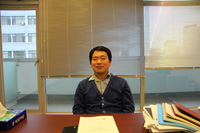It is not every year that the KAIST academic requirements go through major alterations. For the graduating class of 2015, two new mandatory general courses were established, Happy College Life I and II, for the spring and fall semesters of their freshman year respectively. From last December, the courses were designed by current sophomores who had just finished their freshman year. The purpose of these courses is primarily to support freshman students better adjust to life at KAIST.
Could you briefly introduce yourself?
I am Han-Lim Choi, and I am an Assistant Professor of the Division of Aerospace Engineering. I graduated from Gyeonggi Science High School and entered KAIST in 1996, where I finished by Bachelor’s and Master’s degrees. Afterwards, I did my stint of special military service and then went on to MIT for my PhD. I stayed at MIT for the next year and a half before returning to KAIST last March as a professor. My main research areas involve ubiquitous intelligence and sustainable living environments.

Could you describe the new course, Happy College Life?
The course was originally presented by Seung O Park, a professor from Aerospace Engineering who spearheads the Education Innovation Team. I personally think that this course will provide a personal and friendly classroom experience. For example, every class has its own special T-shirts and the students are asked to wear it to class. The classes can go on field trips and various other activities as well. Furthermore, the classmates are assigned to dorm rooms close to each other. The Proctors, upperclassmen in charge of a class, also reside nearby and can help the freshman students whenever and wherever possible. This was done so that the students would also bond further by living together, although its effects are yet to be seen. Hopefully, this class will promote extracurricular networking that goes beyond their respective high schools. Also, a similar program is offered to students entering in the fall semester.
What are your responsibilities as a lecturer for this course?
The responsibilities of each professor are quite minor, if he or she decides to do the bare minimum. On paper, I only get to meet the students for about three sessions. However, the lecturers should go above and beyond the classroom confines. The professors should be approachable individuals who can offer help whenever a student needs it. They should offer impartial advice as a mentor. No student in KAIST should ever have to lose their self-esteem under the pressure of academics. Moreover, no one in KAIST should ever let the students lose their self-esteem either.
How did you become one of the lecturers for this course?
Originally, young professors from each department were chosen to lecture this course. Some of these professors attended KAIST for their undergraduate studies. Thus, in many ways, these professors can make more intimate bonds with the freshman students. Many professors who originally participated in the KAIST Presidential Fellow Mentor Program were transferred to work in this course as well.
I believe that as a research university at heart, KAIST never really gave the attention to the growing undergraduate student population as it should have since the school has more graduate-level students. I personally think that we as a school should make a research-friendly environment for the undergraduate students so that they would want to pursue additional research paths in the future at KAIST.
Do you have any advice for the freshmen?
I want to advise them not to stress themselves out too much, although it is not easy to do so. I think that KAIST students are having a harder time going through college than in the past. As a student, one should do what satisfies them the most, whether it is studying, dating, or extracurricular activities. Freshman students are all adults, and they should be able to make their own decisions in life. However, they should not bear all the consequences for their decisions should they make a bad call. Our school should make an effort to relieve students of the consequences of their decisions.

